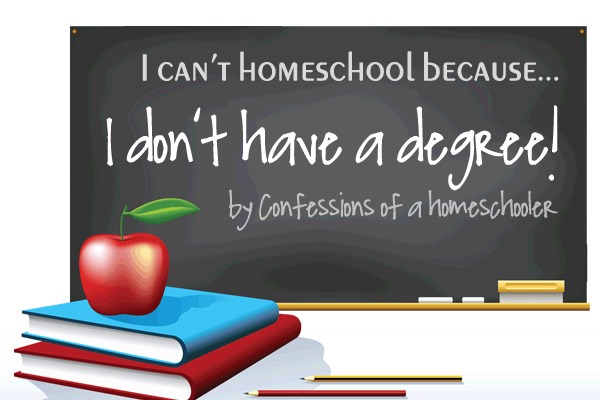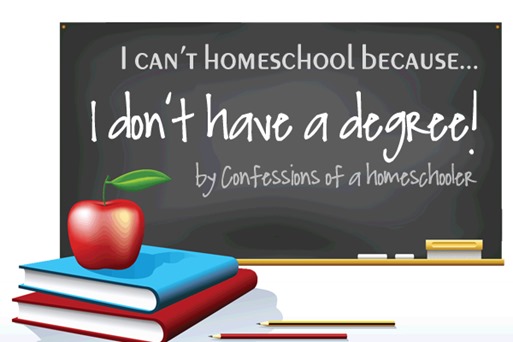Hi everyone! Today, I’m participating in the iHomeschool Network “I Can’t Homeschool Because…” series. Each of the bloggers are posting on common misconceptions and doubts we all face when thinking of taking the leap into homeschooling.
As indicated by the above title, my topic is “I Can’t Homeschool Because I Don’t Have a Degree.” By degree, I’m specifically referring to a teaching degree, but this will apply to questions about teaching without any type bachelor’s or college degree.
The Short Answer:
YES! You absolutely CAN homeschool without a degree. Not only is it not required by most states that a homeschooling parent has a college degree, but it’s simply a misconceived notion that those without a college degree are not intelligent. Certainly that is not the case! (As all state laws are different, please research the laws of your own state prior to homeschooling. For more information on state homeschool law, please visit HSLDA.org )
So what is the requirement for homeschooling:
The main requirement for homeschooling your children is a parent with a loving heart and a desire to give their child the best. You don’t need special training in child psychology. Remember, you know your child better than anyone else! Don’t believe me? Take a look at the statistics gathered by HSLDA in their Homeschool Rankings Based on Parent Certification chart.
How can I teach topics I’m not familiar with?
There are many different curricula on the market for parents to choose from. Most contain everything you need to teach your child, or at least an outline of how to do the lessons. You can choose between everything from pre-scripted step-by-step curricula, to those that are more flexible and allow a great deal of latitude to the parent to organize and share the information with their children.
There are even online courses for more complicated topics that are readily available to homeschooling families if the need should arise.
What if they ask a question I don’t know the answer to?
You’re probably also wondering about what happens when your child has a question you know nothing about. First of all, it has been my experience that most curricula has more information than you can realistically share, and most answers can be found within your curriculum. If there’s a question or topic that needs further research the internet is a wonderful source that is right at most of our finger tips!
When my children ask me a question I don’t know the answer to, I simply say “I’m not sure, let’s look it up!” Then we head to the computer and Google around until we find what we’re looking for. Not only do you get the answers you’re seeking, but online research is a great way to teach kids how to find things themselves. (For younger children, make sure to use parental supervision whenever doing online research.)
So where do I go from here?
As homeschoolers we all face a certain amount of self-doubt and intimidation at the thought of taking on the responsibility of homeschooling our children. Instead of letting that fear overwhelm you, use it to make sure that you are diligent in regards to homeschooling.
I certainly don’t know everything about everything, nor is it realistic of me to think I can master every subject prior to teaching it to my children. But I can be diligent to make sure we are using curriculum that best fits our family and our educational needs, we can learn together as we go, and I can give them the one-on-one guidance that they would never receive in a school classroom.
After 7 years of homeschooling, not only have my children flourished within our homeschool, but I can also say that this journey has also been a great learning experience for me as well!
And if you still have questions, here are more helpful links from the HSLDA website:
- HSLDA.org
- Homeschool Rankings Based on Parent Certification
- View Homeschool Law By State
- Homeschooling a Special Needs Child
- Homeschooling Academic & Demographic Information
10 Days of Getting Started Homeschooling:
- Day 1: Getting a Vision
- Day 2: Homeschooling as a Ministry
- Day 3: Discipline in Your Homeschool
- Day 4: Responsibility & Chores
- Day 5: Love is…Getting Mom Ready 1
- Day 6: Love is…Getting Mom Ready 2
- Day 7: Getting Students Ready
- Day 8: Choosing Curriculum & Homeschool Laws
- Day 9: Organization
- Day 10: Scheduling
All about our homeschooling struggles:
- Candid Conversation with God
- Chore Charts
- Discipline Chart
- How Do I Do it All?
- Not So Quiet Time
- Ministry of Motherhood
- Organization
- Plate Spinning 101
- Storage & Record Keeping
- Teaching Multiple Grades
I hope you enjoyed this post, and make sure to stop by iHomeschool Network to see
what the other bloggers in this series are talking about!
Disclaimer: I am not a legal attorney, nor do I have a degree in law. The information contained in this post is what I have learned from my own research and should not be taken as legal advice. If you have any questions regarding homeschooling, please research the laws in accordance with your own state.





As a former classroom teacher turned homeschool mom, I want to encourage homeschool moms that you do not need a degree to teach children. I also want homeschool moms to cut them selves some slack because homeschooling is WAY harder than classroom teaching. When I taught in a classroom I had 8 hours just to plan, teach, grade, and decorate my classroom. I also only taught one grade. At home I am teaching multiple grades and I am also juggling cooking, cleaning, toddlers, etc.
TFS Amy!
I have a teaching degree and I sometimes think that it hindered more than helped at the beginning. I had a “certain way” that I thought homeschooling needed to go – just like it was done in the classrooms I taught in. I’m thankful I came to realize (after much reading and some trial) that homeschooling can’t be done the same way. It’s different and different is SO good.
Thanks a great article! I’m more worried about homeschooling because I plan on have only one child. Granted, she’s 18 months now. But everyone keeps telling me, that if it’s just going to be us, that would be silly to homeschool. Ugh!
Hi Holly,
I have plenty of friends who homeschool with only one child and they do a wonderful job! They also do things like co-ops, play-dates, and other activities to further benefit their child’s education. Actually one of my good friends hosts a monthly Lego club for several other families as well as a monthly science day too. It’s a wonderful blessing to me as well as all of the other families that come!
Sill to homeschool only one child? Why? What’s the difference between one and ten? I don’t get it unless they are speaking of being non-social. If you are involved in a local church and have a homeschool support group and go to parks for play and have family gatherings with other children and/or do extra curricular outside of the home (physical education), you have more than enough social experience for your only child. You don’t want to put her in the wrong social environment. You are her parent and what is important is how you feel led to educate your child not what other people think. I have a friend that replies to people that question homeschooling and she tells them that she does not have the faith to put her children in a public school. Well said. 🙂
I really like your comments. As a home schooled kid and now as a home school mom, I have answered so many of these questions myself. One thought though, you mention that you don’t have to have a degree to home school. While that is philosophically true, several states (at least the last time I had this discussion) had legal requirements of a degree of some sort. I noticed that you linked laws by state, but I just wanted to clarify that point.
Hi Dana,
Yes, each state law is different, mostly they require a degree to perform the bi-annual testing of children, but not the actual homeschooling of them. I’ll edit the post to make sure people realize to check their state laws. Thanks :o)
Hi Erica,
My kids are still small (2&3 y/o), but we plan on homeschooling and the one topic that keeps coming up is socialization. I recently had some doubts and then we had some children over. Parents complimented our children so much – their extensive vocabulary, their social skills with children and adults alike. I think that was God’s way of letting us know that we are making the right decision to homeschool. Our children even at their young ages were extending out their hands when meeting new people to say, “Hi. Nice to meet you.” None of the other children did that. Thank you for this post.
Karina
I have a bachelor’s degree but not a teaching degree and I agree that neither are necessary! My favorite response is…”If the education I received (public school) doesn’t make me qualified to teach my own children then why would I send my kids there too! 🙂
Absolutely!
So True!
Thanks for the encouragement.
This makes me feel more confident in my decision! We are only doing preschool right now but I’m already doubting my abilities when it comes to the actually school grades. The fear has helped me become more serious in doing my research!
I have just recently found this blog and absolutely love it… more so after reading this post! I’m a high school graduate with no college. I’m not anti college but all I’ve ever wanted to do is be a stay at home mom and homeschool my kids and I did not see the point in going into debt for a degree that I didn’t need. I’ve always felt “qualified” to teach my kids. There have been times where I haven’t had all the answers and we’ve had to hunt for them but I believe that has only fostered a love for learning in my kids. I’m learning so much with my kids and we are all enjoying the journey!
I love it!!! My wife and I have had lots of reasons not to homeschool but have never let any of them stop us. Even if you are well educated you will most likely end up trying to stay one chapter ahead of your kids in many subjects. The sad fact of it is that I remember very little of what I learned in school.
ugh! have you seen this one? http://thestir.cafemom.com/big_kid/152471/parents_who_homeschool_arent_qualified